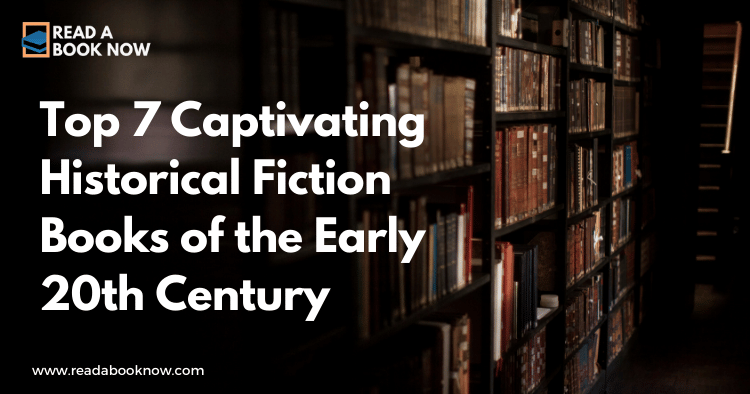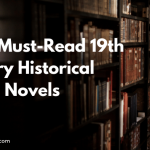Table of Contents
- Introduction
- 1. The Great Gatsby by F. Scott Fitzgerald
- 2. A Passage to India by E.M. Forster
- 3. The Sun Also Rises by Ernest Hemingway
- 4. The Age of Innocence by Edith Wharton
- 5. Their Eyes Were Watching God by Zora Neale Hurston
- 6. The Amazing Adventures of Kavalier & Clay by Michael Chabon
- 7. A Farewell to Arms by Ernest Hemingway
- Conclusion
- FAQs
Introduction
The early 20th century was a time of tremendous change, marked by two World Wars, economic upheaval, and cultural revolutions. Authors of this era captured these tumultuous times through the lens of fiction, providing readers with insights into society, relationships, and the human condition. In this blog, we’ll explore seven captivating historical fiction books from the early 20th century that not only entertain but also illuminate the complexities of their time.
1. The Great Gatsby by F. Scott Fitzgerald
F. Scott Fitzgerald’s The Great Gatsby is a quintessential portrayal of the Roaring Twenties. Set in the summer of 1922, the novel follows the mysterious millionaire Jay Gatsby and his obsession with the beautiful Daisy Buchanan. Through the eyes of Nick Carraway, the novel explores themes of wealth, love, and the American Dream, all against the backdrop of a society in the throes of change.
“In my younger and more vulnerable years, my father gave me some advice that I’ve been turning over in my mind ever since.”
Why You Should Read It
- Cultural Significance: The novel captures the essence of the Jazz Age, making it a critical piece of American literature.
- Character Depth: Fitzgerald’s characters are multi-dimensional, providing a rich exploration of human motivations and desires.
For more on the impact of The Great Gatsby, check out this analysis.
2. A Passage to India by E.M. Forster
E.M. Forster’s A Passage to India delves into the complicated relationship between British colonizers and the Indian populace during the 1920s. The story revolves around the friendship between an Indian doctor, Dr. Aziz, and a British woman, Adela Quested, amidst the backdrop of cultural misunderstandings and political tension.
“The novel is a great study of the flaws in the human character, as well as the complexities of colonialism.”
Why You Should Read It
- Cultural Exploration: The novel presents a nuanced look at colonialism, race, and identity, making it highly relevant today.
- Literary Merit: Forster’s masterful prose and rich symbolism offer readers layers of meaning to uncover.
To dive deeper into its themes, visit this insightful article.
3. The Sun Also Rises by Ernest Hemingway
Ernest Hemingway’s The Sun Also Rises paints a vivid picture of the post-World War I generation, known as the “Lost Generation.” The novel follows a group of expatriates as they travel from Paris to Pamplona, Spain, to witness the running of the bulls. Through their experiences, Hemingway explores themes of disillusionment, masculinity, and the search for meaning.
“You can’t get away from yourself by moving from one place to another.”
Why You Should Read It
- Impactful Writing Style: Hemingway’s signature terse prose and dialogue-driven narrative make the story engaging and relatable.
- Exploration of Existential Themes: The characters’ struggles resonate with anyone questioning their purpose in a changing world.
Learn more about Hemingway’s writing style here.
4. The Age of Innocence by Edith Wharton
Edith Wharton’s The Age of Innocence is a poignant exploration of upper-class society in New York during the 1870s, reflecting on themes of tradition, love, and societal expectations. The story follows Newland Archer, who is torn between his duty to marry May Welland and his attraction to the unconventional Countess Ellen Olenska.
“The one thing I can’t stand is a woman who can’t make up her mind.”
Why You Should Read It
- Rich Social Commentary: Wharton provides a critical view of the constraints placed on women and the societal norms of her time.
- Award-Winning: The novel won the Pulitzer Prize for Fiction in 1921, solidifying its status as a classic.
For a deeper understanding of its themes, check out this comprehensive guide.
5. Their Eyes Were Watching God by Zora Neale Hurston
Zora Neale Hurston’s Their Eyes Were Watching God is a groundbreaking novel that tells the story of Janie Crawford, an African American woman in the early 20th century South. Through her journey of self-discovery and love, the novel addresses themes of race, gender, and empowerment.
“There are years that ask questions and years that answer.”
Why You Should Read It
- Cultural Impact: Hurston’s work is a pivotal piece of the Harlem Renaissance, offering valuable insights into African American life.
- Narrative Style: The use of Southern dialect and rich imagery creates an immersive reading experience.
Explore the significance of this novel in this article.
6. The Amazing Adventures of Kavalier & Clay by Michael Chabon
Michael Chabon’s The Amazing Adventures of Kavalier & Clay follows two Jewish cousins who create a comic book superhero during the golden age of comics in the late 1930s. The story reflects the immigrant experience and the impact of World War II on American society.
“The only thing that can save us is love, and the only thing that can destroy us is love.”
Why You Should Read It
- Blend of Genres: The novel combines history, adventure, and fantasy, appealing to a broad range of readers.
- Emotional Depth: Chabon explores themes of identity, loss, and creativity, making the characters relatable.
For deeper insights into the book’s themes, visit this resource.
7. A Farewell to Arms by Ernest Hemingway
Another masterpiece by Ernest Hemingway, A Farewell to Arms is a semi-autobiographical novel set during World War I. It tells the love story between an American ambulance driver in the Italian army and a British nurse. The narrative is a powerful exploration of love, loss, and the futility of war.
“There is never any ending to Paris and the memory of each person who has lived in it differs from that of any other.”
Why You Should Read It
- Realistic Portrayal of War: Hemingway’s firsthand experience adds authenticity to the depiction of the horrors of war.
- Timeless Themes: The exploration of love amidst chaos resonates across generations.
To learn more about its historical context, check out this analysis.
Conclusion
These seven captivating historical fiction books of the early 20th century offer a wealth of insights into the social, political, and cultural landscapes of their time. Whether you’re looking for romance, adventure, or a deep exploration of human nature, these novels provide a rich tapestry of experiences that remain relevant today.
FAQs
Q: What defines historical fiction?
A: Historical fiction is a literary genre that takes place in the past, often incorporating real historical events, figures, and settings while weaving in fictional characters and narratives.
Q: Why is historical fiction important?
A: Historical fiction allows readers to gain perspectives on different eras, understand cultural contexts, and explore the human experience through the lens of history.
Q: Are there contemporary historical fiction authors worth reading?
A: Yes! Authors like Ken Follett, Hilary Mantel




